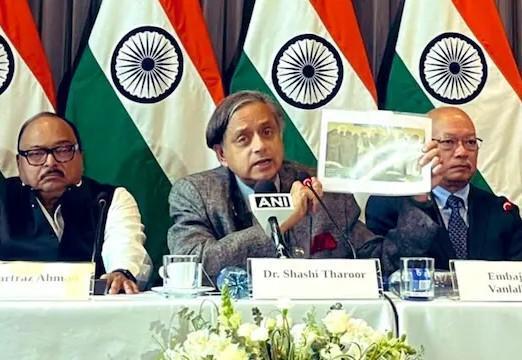
No Equivalence between Pak & India: Tharoor on Colombia’s Reaction on Op Sindoor
The recent Operation Sindoor, carried out by the Indian Army in Jammu and Kashmir, has led to a significant escalation in tensions between India and Pakistan. The operation, aimed at neutralizing terrorist hideouts and infrastructure, has resulted in significant losses on both sides. While India has been vocal about its right to self-defence, Pakistan has been accusing New Delhi of aggression.
In the midst of this heightened tension, a decision by the Colombian delegation to condole the loss of lives in Pakistan due to Operation Sindoor has drawn ire from Indian circles. Congress MP Shashi Tharoor, known for his articulate views on international affairs, has been critical of the Colombian government’s decision, saying that it is “disappointing” and underscores the lack of understanding of the issue at hand.
In an exclusive interview with News18, Tharoor explained that there can be no equivalence between those who dispatch terrorists and those who resist, those who attack and those who defend. “We’re exercising our right of self-defence,” he emphasized, highlighting the need for countries to distinguish between the perpetrators of terrorism and those who are fighting against it.
Tharoor’s remarks come at a time when India has been grappling with the menace of terrorism, which has claimed thousands of lives in recent years. The Uri attack, Pulwama attack, and numerous other incidents have demonstrated the need for strong action against terrorist organizations and their patrons. Operation Sindoor, therefore, can be seen as a necessary response to the ongoing threat posed by terrorism in the region.
The Colombian government’s decision, on the other hand, has been seen as a significant setback for India’s efforts to combat terrorism. By condoning the loss of lives in Pakistan, Colombia has sent a message that both India and Pakistan are equally culpable in the violence. This, Tharoor believes, is a misguided approach that fails to recognize the fundamental difference between the two nations.
“We cannot equate those who are perpetrating terrorism and those who are fighting against it,” he stressed, emphasizing the need for countries to take a strong stance against terrorism. “If we don’t stand up against terrorism, we will be seen as complicit in its spread,” he warned, highlighting the consequences of inaction.
Tharoor’s views have been endorsed by many in India, who see the Colombian government’s decision as a betrayal of the country’s commitment to fighting terrorism. The move has also been criticized by many in the international community, who have urged the Colombian government to reconsider its stance.
In the midst of this controversy, China has also been drawn into the fray, with many in India accusing Beijing of supporting Pakistan’s terrorist activities. Tharoor, however, believes that China’s role in the region is more complex and nuanced.
“China is a significant player in the region, and its interests are not necessarily aligned with Pakistan’s,” he said, highlighting the need for a nuanced understanding of China’s role in the region. “We need to engage with China and persuade it to see the issue in its true light,” he emphasized.
In conclusion, Tharoor’s remarks underscore the need for countries to take a strong stance against terrorism and to distinguish between the perpetrators of terrorism and those who are fighting against it. The Colombian government’s decision, while disappointing, highlights the need for countries to engage in a nuanced discussion about the issue at hand.
As the situation in Jammu and Kashmir continues to evolve, it is essential that countries like Colombia and China take a clear and unequivocal stance against terrorism. Anything less would be a betrayal of the global commitment to fight against this scourge.



